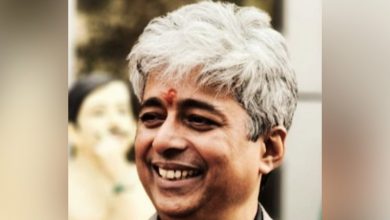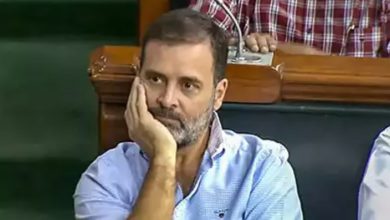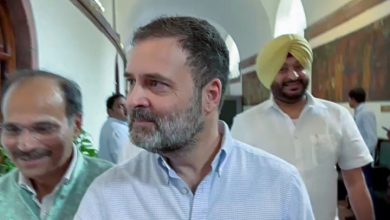
The elevation of Yogi Adityanath to the Uttar Pradesh chief minister’s chair is as much an ideological statement as it is political. It indicates a confident BJP under the guidance of Narendra Modi performing the last rites of Nehruvian secularism, the political process for which had started in 2014.
Before we delve into the doctrinal change of guard and what it really means for us as a nation, let us first understand how political power leads to ideological ascendancy. Let me add here that political power ipso facto does not translate into ideological dominance. It is dependent on a certain set of conditions. When those are fulfilled, the change of guard becomes imminent; once the process starts, it is irreversible.
By electing BJP’s most strident Hindutva icon Yogi Adityanath as UP chief minister, Modi is providing finishing touches to his promise of Congress-mukt Bharat. Displacing Congress from the seat of power was the first step. Congress is as much an idea as it is a political party.
Modi is now removing that ‘Idea of India’ and replacing it with another — one that has its roots in the ancient Dharmic tradition of pluralism as opposed to the European brand of secularism that is the backbone of our political discourse. From being a potent political force in 2014, BJP is now providing Indians with an alternate worldview that has long been kept suppressed and marginalised on the fringes of our intellectual landscape.
A tectonic shift in India’s ideological map is now underway. It is becoming clear that the UP verdict has deeper significance and may alter permanently India’s future as a nation. Is the future bright? Is it pitch dark? Various commentators have offered several interpretations. While some, such as the Centre for Policy Research director Pratap Bhanu Mehta, have called Yogi’s elevation into political mainstream an “odious and ominous development”, US-based Indologist and Vedic scholar David Frawley sees India benefiting “from a new leadership rooted in its profound dharmic traditions”.
The overwhelming reaction in mainstream media, though, has been one of dismay and disbelief. Media and members of India’s civil society have predicted that India will become a “Hindutva laboratory” and a “graveyard for minorities”. Without going into the merits or demerits of this argument, let us first examine why Yogi Adityanath presents an existential threat to current definitions of “secularism”.
This definition, which has its roots in the debate that arose in Europe from the complex interplay of Church and State and the overriding influence of the former over every other human institution, was part of European enlightenment, and one that Jawaharlal Nehru was deeply influenced by. In his zeal for nation-building, however, Nehru imposed this western notion of “secularism” to safeguard the interest of the minorities in a predominantly ‘Hindu’ India.
The intention was noble. But a problem germinated. Secularism in its unvarnished European tradition ordinates strict separation of the Church and the State. This axiom of European modernist thinking sits at odds with the Indic tradition, where the concept of ‘dharma’ isn’t just religion but a way of life. ‘Dharmic’ did not just refer to the pious, but also to the one on the path of truth and justness. In this sense of dharma, it did not even pertain to one specific religion either. Even a Muslim or Christian could be ‘dharmic’ if he chooses the path of dharma.
Not unusually, however, western-educated Nehru who had seen the conflict between narrow definition of religion and its stifling control over every sphere of human life had his discomfort with religion and is recorded to have held that the “word religion has lost all precise significance (if it ever had it!) and only causes confusion and gives rise to interminable debate and argument. It would be far better if it was dropped from use altogether”.
Instead of going into simplistic reductions, it will be fair to say that the Nehruvian worldview was deeply discomfited by the predominance of religiosity in Indians’ daily lives and he resembled Tennyson’s Ulysses while administering “Unequal laws unto a savage race/That hoard, and sleep, and feed, and know not me.”
Quoting from Gopal and Iyengar, Rajeev Bhargava writes in EPW that Nehru was “particularly critical of the ‘Hindu Rashtra’ or a Hindu nation state” and had held that while “It may sound very nice to some people that we will create a Hindu Rashtra, but I cannot understand what it means. Hindus are in the majority in this country and whatever they wish will be done. But the moment you talk of a Hindu Rashtra, you speak in a language which no other country except one can comprehend and that country is Pakistan because they are familiar with this concept. They can immediately justify their creation of an Islamic nation by pointing to the world that we are doing something similar. Hindu Rashtra can only reduce the status of those who are not Hindus…”
It is not the scope of this column to ascertain whether Nehru was right or wrong. What is more relevant is that due to Congress’ enormous and unchallenged political dominance, the Nehruvian worldview was institutionalised and India’s intellectuals were duly indoctrinated — a dominance that lasted for several decades. All rules of battles apply. The fiefdom was fiercely guarded, as all dissenting voices were either meticulously removed or systematically sanitised. Nehru may have been inclusive in his moral universe, but the intellectual disciples that he beget were not.
In a column for Hindustan Times, Swapan Dasgupta writes, “The near-unchallenged political dominance of some six decades led to the Nehruvian consensus becoming common sense among the intelligentsia, particularly those in the liberal professions. This section has guarded its echo chamber fiercely and denied institutional space to those that don’t quite fit into the Left-liberal mould. Consequently, the challenge to the Nehruvian order has come from quarters that have a marked anti-intellectual bias, not least because their relevance stemmed from electoral politics.”
In time, this version of Nehruvian secularism became utterly corrupted and stood for everything that Nehru himself guarded against.
Flush with political power, Modi-led BJP is now challenging this ideological dominance. The path towards this hasn’t been smooth. We frequently make the mistake of confusing transient political power with the true establishment that pulls all strings of academic traditions and moulds citizens of the future by influencing the entry points of intellectual and political discourses. A party may remain in power for five years, but that automatically does not give it the power to rewrite ideological predispositions.
The scale, breadth and significance of Modi’s victory finally gives BJP the chance to challenge the dominant narrative of “secularism”.
In his column for Indian Express, Pratap Bhanu Mehta had perhaps foreseen this move when he wrote, “The BJP is also poised to increase its institutional dominance; the victory has profound implications for its ability to shape so many institutions, from the Rajya Sabha to the presidency. And electoral, social and institutional dominance will inevitably lead to unchallenged ideological ascendancy as well.”
It is this ideological ascendancy that we are now witnessing, where BJP feels that the mandate gives it the licence to install a ‘Hindu rashtra’ and steer India towards its own version of “secularism”, which is rooted in the dharmic tradition of pluralism. There will be still be exclusive focus on development, but it will be carried out within the framework of a ‘Ram Rajya’.
It will be a mistake, however, to judge these phrases through the lens of Nehruvian secularism. Simply put, Modi is signaling the beginning of ‘Hindu rashtra’ by appointing Adityanath at UP helm.
We can only hope that it won’t be in the narrow sense of a Hindu Pakistan but in the way University of San Francisco’s Vamsee Juluri means, when he writes in Huffington Post that “Young Hindus see themselves as part of a great civilisational heritage, and value it not just for its ancient glory, but also because they see its spirituality as being the core of their civilisational ethic of coexistence and respect for all religions. If Muslims, Christians, Sikhs, Buddhists, Jains, and many different kind of Hindus divided by language, custom, caste and history still share a land and history so deeply, they know it is not simply because of India’s secular Constitution, but because of Hinduism’s ancient legacy of respecting all faiths.”
This is a civilisational, ideological shift. The battle lines are drawn. We have not heard the end of this debate yet. But make no mistake, the time for Nehruvian secularism is over.







